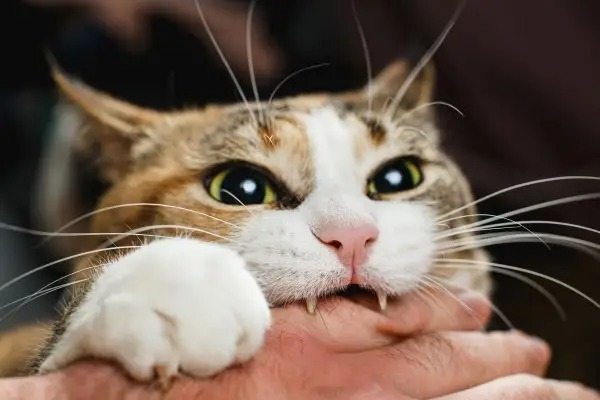If your cat suddenly starts biting, do not rush to panic. This behavior can be caused by a variety of reasons, ranging from an expression of love to symptoms of illness. Let’s take a closer look.
1. Affectionate bites – a manifestation of love.
Cats sometimes bite lightly when they want to show their sympathy. These “love bites” are usually painless and are often accompanied by purring or gentle “kneading” with their paws. This is their way of expressing affection.
2. Fear and anxiety.
When a cat feels threatened or is very stressed, it may bite in self-defense. Signs of anxiety include dilated pupils, hissing, tucked ears, an arched back, and a tense tail. It is best not to approach the cat at such moments.
3. “Cuddle – bite”.
Sometimes, a cat enjoys affection and then suddenly bites. This may be due to overstimulation. Signs include tension in the body, cessation of purring, and twitching of the tail.
4. Reaction to frustration.
If your pet is trying to get your attention and does not receive a response, it may show irritation through biting. This is how the cat indicates that its desires are being ignored.
5. Play without boundaries.
Kittens and young cats often bite during play. This is a natural form of interaction, but allowing biting of hands and feet can lead to this behavior becoming ingrained and continuing into adulthood.
6. Adaptation to change.
New animals or visitors can cause stress and a feeling of threat in a cat. It may show aggression directed at the owner if it cannot reach the irritant (redirected aggression).
7. Physical pain.
If the cat’s behavior suddenly changes and it begins to bite for no reason, this may signal pain or illness. In such cases, a veterinary examination is necessary – there may be problems, such as arthritis or another chronic disease.
What to do if a cat bites: Tips
Offer your cat toys and activities to channel its energy in a safe direction.
Never use your fingers or feet as toys – this creates the wrong associations. It is better to use special toys.
Praise your cat and give it treats for calm behavior. This will help form good habits.
Physical measures can worsen the situation and break trust. Instead of punishment, use distraction techniques and rewards for good behavior.
First aid for a cat bite.
If a cat bites you, it is essential not to delay treating the wound:
Wash the bite area with water and mild soap.
Treat with an antiseptic.
Apply a sterile bandage.
Be sure to see a doctor – cat bites often lead to infections, as their saliva may contain dangerous bacteria.
This behavior in cats is not a reason to panic but a signal that the pet needs something or is worried about something. Patience, attention, and love will help establish contact and minimize bites.

 Discuss
More news
Discuss
More news


